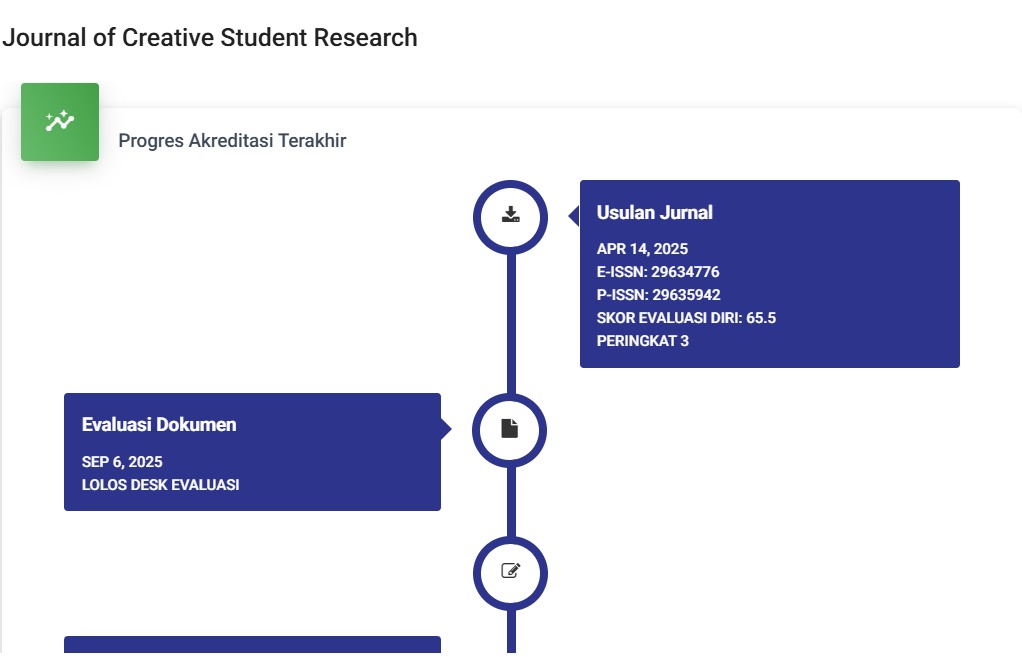Pengaruh Puasa Menurut Perspektif Islam Dan Sains Dalam Menurunkan Berat Badan Pada Pasien Obesitas Dan Diebetes
DOI:
https://doi.org/10.55606/jcsrpolitama.v1i6.2878Keywords:
diabetic, fasting, obese, patientsAbstract
Fasting is a voluntary action carried out by restraining the appetite for eating, drinking and anything that could break it for a certain period of time. One example of fasting is Ramadan fasting. Ramadan fasting is a fast that is carried out during the month of Ramadan for 29 days or 30 days. The time for fasting during Ramadan begins when the sun rises at dawn until sunset. Fasting is a voluntary action carried out by restraining the appetite for eating, drinking and anything that could break it for a certain period of time. The time for fasting during Ramadan begins when the sun rises at dawn until sunset. Fasting is a deep practice in Islam and has the potential to impact human health, especially in the context of obesity and diabetes. Aim: To determine the effect of fasting according to Islamic and scientific perspectives in reducing weight in obese and diabetic patients. Methods: This research involved a careful literature review and analysis of data from a variety of relevant sources. We evaluated scientific research on fasting in the context of weight loss and diabetes management. We also combine it with the Islamic religious view of fasting, especially during the month of Ramadan. Results: Fasting, both from an Islamic and scientific perspective, can have a positive impact on obese and diabetic patients. Ramadan fasting, which involves fasting from dawn to sunset, has been linked to improved blood sugar control and weight loss in diabetes patients. Additionally, intermittent fasting, such as the 16/8 method, has been shown to be effective in improving insulin sensitivity and reducing body weight in obese individuals. Studies also show that fasting can reduce the risk of heart disease, which is often associated with diabetes. Discussion: This article discusses health implications from two points of view: religion and science. Combining Islamic views on fasting with scientific research provides a strong basis for applying fasting methods in the management of obesity and diabetes. Conclusion: Fasting, from both an Islamic and scientific perspective, has great potential in reducing weight and managing diabetes in obese patients. This approach may be an effective adjunct in the treatment of this condition. Therefore, it is important to understand and utilize the benefits of fasting wisely, taking into account religious views and medical recommendations..
Downloads
References
Alfin, R., Busjra., Azzam, R. (2019). Pengaruh Puasa Ramadhan Terhadap Kadar Gula. Journal of Telenursing (JOTING)
Cherif, A., Roelands, B., Meeusen, R., Chamari, K. (2016) Effects of Intermittent Fasting, Caloric Restriction, and Ramadan Intermittent Fasting on Cognitive Performance at Rest and During Exercise in Adults. Sport Med. 46(1):35–47
Farmaka, (2018) Puasa Ramadhan dan Diabetes. Jurnal Unpad: (vol 16, no 1) http://jurnal.unpad.ac.id/farmaka/article/view/17498
Gastroenterology, T. I. (2014). National Consensus on the Management of Gastroesophageal. Acta Medica Indonesiana - The Indonesian Journal of Internal Medicine, 46, 263-271.
Hidayah. (2023) Kelebihan Berpuasa dalam Menangani Masalah Kesehatan https://www.mmgazette.com/kelebihan-berpuasa-dalam-menangani-masalah-kesihatan-manusia-dr-noraziah-nordin-ahmad-faris-imran-rusli/
Hussin, N.M., Shahar, S., Teng, NIMF, Ngah WZW., Das S.K. (2013) Efficacy of Fasting and Calorie Restriction (FCR) on mood and depression among ageing men. J Nutr Heal Aging. 17(8):674–680.
Julahir, H.S. (2019) Pengaruh Puasa terhadap Indeks Massa Tubuh Pasien Diabetes. Jurnal delihusada: (vol 1, no 2) http://ejournal.delihusada.ac.id/index.php/JPKSY/article/download/168/106/
Khan, A., Khattak, M.M. (2002). Islamic Fasting, An Effective for Prevention and Control of Obesity. Pakistan Journal of Nutrition
Khodijah, S. (2019) Manfaat Puasa dalam Perspektif Islam dan Sains. Journal of Islamic Interdisciplinary Studies: (vol 2, no 1) https://ejournal.tmial-amien.sch.id/index.php/nihaiyyat/article/view/68
Krista, A. (2020) Alternate dan fans ting for weight loss in normal weight and overweight. Nutritions jurnal: (vol 2). https://nutritionj.biomedcentral.com/articles/10.1186/1475-2891-12-146
Lelah, H ( 2019) Puasa dalam Kajian Islam dan Kesehatan. Jurnal: IAIN https://web.archive.org/web/20180412062740id_/http://e-journal.perpustakaanstainpsp.net/index.php/hikmah/article/viewFile/65/pdf_4
Ling, X. (2022) Puasa: Potensi Jembatan Obesitas dan Diabetes bagi Kesehatan. https://www-mdpi-com.translate.goog/2072-6643
Mumun, M. (2021) Puasa Ramadhan dan Obesitas. https://www.poltekkesjakarta1.ac.id/wp-content/uploads/legacy/jurnal/dokumen/2Jurnal_Mumun.pdf.
Munigar, M. (2013). Puasa Ramadhan dan Obesitas. Jurnal Health Quality, 47-53.
Mustika, R. (2019) Pola Makan Menurut Hadist Nabi SAW. Jurnal uin-alauddin: (vol. 7). https://journal.uin-alauddin.ac.id/index.php/diskursus_islam/article/download/10144/pdf
Nair, P., Khawale, P. (2016) Role of therapeutic fasting in women’s health: An overview. J Midlife Health, 7(2):61–64.
Rosyidina, E.N (2021) Diet yang Menyehatkan. Jurnal Al-‘jaz: (vol 3 no. 2). https://jurnal.stiqsi.ac.id/index.php/AlIJaz/article/download/64/62
Probosuseno, (2022) Manfaat Berpuasa Bagi Kesehatan Tubuh https://fkkmk.ugm.ac.id/manfaat-berpuasa-bagi-kesehatan-tubuh/
Putu A., Supraba, A. (2020) Pengaruh Puasa Berselang Terhadap Berat Badan. Jurnal: sains (vol 11, no 3). https://isainsmedis.id/index.php/ism/article/download/173/630/3406
Virgi, A. (2022) Efektivitas Puasa Intermiten Terhadap Penurunan Berat Badan pada Penderita Obesitas. https://etd.repository.ugm.ac.id/penelitian/detail/211553
Wan, R., Ahmet, I., Brown, M. (2010) Cardioprotective effect of intermittent fasting is associated with an elevation of adiponectin levels in rats. J Nutrit Biochem. 21: 413-417.
Downloads
Published
How to Cite
Issue
Section
License
Copyright (c) 2023 Journal of Creative Student Research

This work is licensed under a Creative Commons Attribution-NonCommercial-ShareAlike 4.0 International License.








